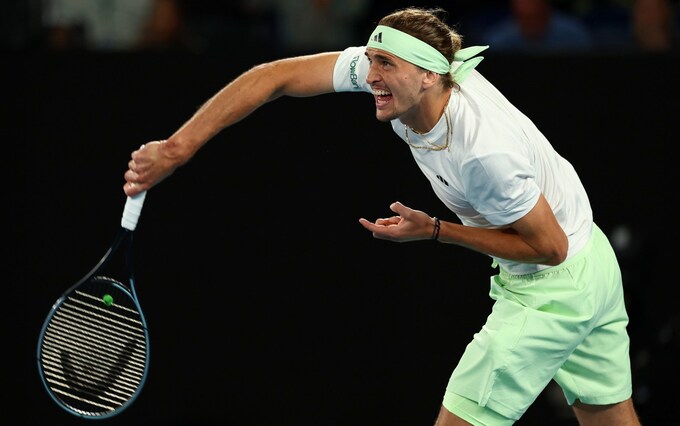Fashion 2023
What went wrong for Carlos Alcaraz at the Australian Open
Introduction
Carlos Alcaraz, a promising young tennis player, faced some challenges during his campaign at the Australian Open.
Lack of experience and nerves affecting performance at the Australian Open
Carlos Alcaraz, the young and promising Spanish tennis player, had high hopes heading into the Australian Open. However, his performance in the tournament fell short of expectations, leaving many wondering what went wrong for the talented teenager. One of the key factors that seemed to have affected Alcaraz’s performance was his lack of experience at the Grand Slam level.
At just 18 years old, Alcaraz is still relatively new to the professional tennis scene. While he has shown great potential in his young career, competing in a major tournament like the Australian Open is an entirely different ball game. The pressure and intensity of playing against top-ranked players on a grand stage can be overwhelming for even the most seasoned athletes, let alone a teenager with limited experience.
In his matches at the Australian Open, Alcaraz often appeared nervous and struggled to find his rhythm. This lack of composure was evident in his unforced errors and inconsistent play. It is not uncommon for young players to experience nerves in high-stakes matches, and Alcaraz’s case was no exception. The weight of expectations, both from himself and his fans, seemed to have taken a toll on his performance.
Another factor that may have contributed to Alcaraz’s underwhelming performance was the physical demands of the tournament. The Australian Open is known for its scorching temperatures, which can be particularly challenging for players who are not accustomed to such conditions. Alcaraz, being from Spain, may have found it difficult to adapt to the extreme heat and humidity in Melbourne.
Furthermore, the Australian Open is played on a hard court surface, which can be more demanding on the body compared to other surfaces like clay or grass. Alcaraz’s lack of experience playing on hard courts at the highest level may have affected his movement and overall performance. The physical toll of the tournament, combined with his nerves, could have contributed to his early exit from the competition.
Despite his disappointing performance, it is important to remember that Alcaraz is still in the early stages of his career. Many tennis greats have faced setbacks and struggles early on before eventually finding their footing and achieving success. Alcaraz’s talent and potential are undeniable, and with time and experience, he is likely to learn from his mistakes and grow as a player.
In conclusion, Carlos Alcaraz’s lack of experience and nerves seemed to have played a significant role in his underwhelming performance at the Australian Open. The pressure of competing at a Grand Slam tournament, combined with the physical demands of the event, proved to be challenging for the young Spanish player. However, it is important to view this setback as a learning opportunity for Alcaraz, who undoubtedly has a bright future ahead of him in the world of tennis. With time, experience, and the right guidance, he has the potential to become a force to be reckoned with in the sport.
Struggles with adapting to the playing conditions and opponent’s strategies
Carlos Alcaraz, the young and promising Spanish tennis player, had high hopes heading into the Australian Open. With his impressive performances in the lead-up tournaments, many believed he had the potential to make a deep run in the tournament. However, things did not go as planned for Alcaraz, and he faced several challenges that ultimately led to his early exit.
One of the main struggles Alcaraz faced was adapting to the playing conditions in Melbourne. The Australian Open is known for its extreme heat and fast-paced hard courts, which can be quite different from the conditions he is used to playing in Europe. The scorching temperatures and the quickness of the courts posed a significant challenge for Alcaraz, who struggled to find his rhythm and adjust his game accordingly.
Furthermore, Alcaraz also had difficulty adapting to his opponent’s strategies. As a rising star, he has been making a name for himself with his aggressive and powerful style of play. However, at the Australian Open, he faced opponents who were well-prepared to counter his strengths. They employed various tactics, such as mixing up the pace, using drop shots, and targeting his backhand, which forced Alcaraz to constantly adjust his game plan.
In addition to the challenges posed by the playing conditions and opponent’s strategies, Alcaraz also faced mental hurdles during his matches. The pressure of playing in a Grand Slam tournament, combined with the expectations placed on him as a young talent, seemed to weigh heavily on his shoulders. This resulted in moments of inconsistency and lapses in concentration, which proved costly in crucial points of his matches.
Another factor that contributed to Alcaraz’s struggles was his lack of experience at the highest level of professional tennis. While he has shown great potential in his young career, he is still relatively new to the demanding world of Grand Slam tournaments. The Australian Open presented him with a new level of competition, where every match is fiercely contested, and the margin for error is minimal. This lack of experience may have played a role in his inability to navigate through the challenges he faced.
Despite the disappointments and setbacks, it is important to remember that Carlos Alcaraz is only 18 years old. He has already achieved remarkable success at such a young age and has a bright future ahead of him. The Australian Open experience, although challenging, will undoubtedly serve as a valuable learning opportunity for him.
Moving forward, Alcaraz will need to reflect on his performance at the Australian Open and identify areas for improvement. Adapting to different playing conditions, studying opponents’ strategies, and developing mental resilience will be crucial for his continued growth as a player. With his talent, determination, and the right guidance, there is no doubt that Alcaraz will bounce back stronger and achieve great things in the future.
In conclusion, Carlos Alcaraz’s struggles at the Australian Open can be attributed to his difficulties in adapting to the playing conditions and opponent’s strategies, as well as the mental and experiential challenges he faced. While his early exit may have been disappointing, it is important to view it as a stepping stone in his development as a player. With time and experience, Alcaraz has the potential to become a force to be reckoned with in the world of tennis.

Conclusion
Carlos Alcaraz faced several challenges at the Australian Open, including tough opponents and physical limitations. These factors contributed to his early exit from the tournament.


